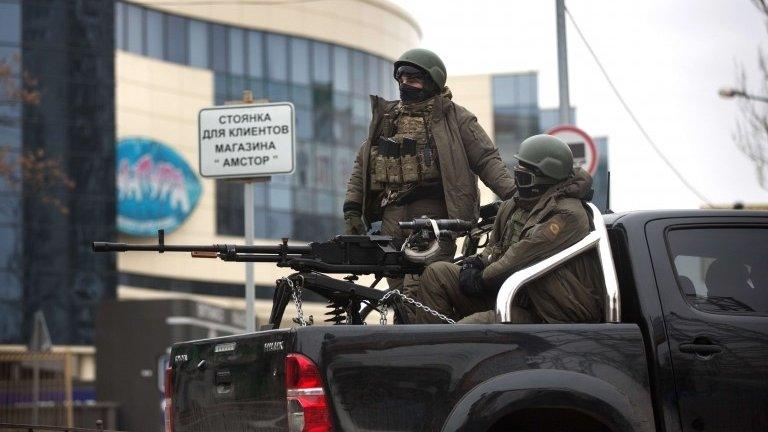East-West conflict set to run and run
- Published
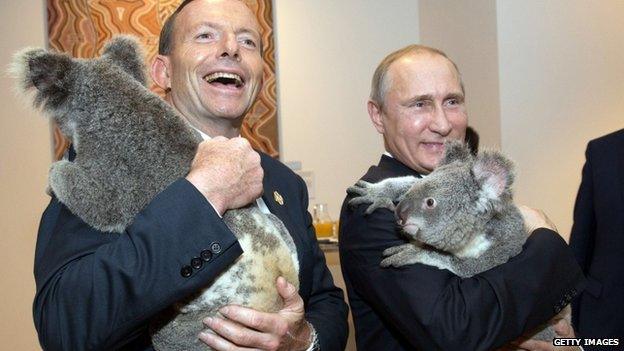
Hard-nosed diplomacy?
Australian Prime Minister Tony Abbott threatened to "shirtfront, external" President Putin over Ukraine.
This is apparently an Australian expression suggesting pushing into someone's personal space, squaring off for a fight, eyeball to eyeball, shirt button to shirt button.
This was rather undermined by pictures of the two men, external, side by side, cuddling koalas. Unless marsupial hugging has an Antipodean cultural meaning that eludes me it seemed a couple of kangaroos short of a boxing match.
But Mr Abbott was in a queue of English-speaking leaders who wanted to have a pop at Putin.
President Obama, the Canadian prime minister and, of course, our own David Cameron told him in their various ways to "get out of Ukraine" while muttering about more sanctions.
It's rhetoric, not reality.
A couple of days later, foreign ministers from the EU failed to agree more sanctions against Russia.
The trouble is while the tough talk was probably responsible for the early departure of Mr Putin and his four warships, it did not change his foreign policy.
Provoking a huff is a laugh, but not sophisticated diplomacy.
As the leaders of the English-speaking bits of the West deployed their righteous indignation, the Russians were apparently sending the very latest in military tech, external into eastern Ukraine.
In short, sanctions are hurting, but they are not working.
Inflamed brinkmanship
Moreover, Mr Putin knows all about shirtfronting: he is button to button with the West along a 4,000 mile border, and pushing his chest further forward all the time.
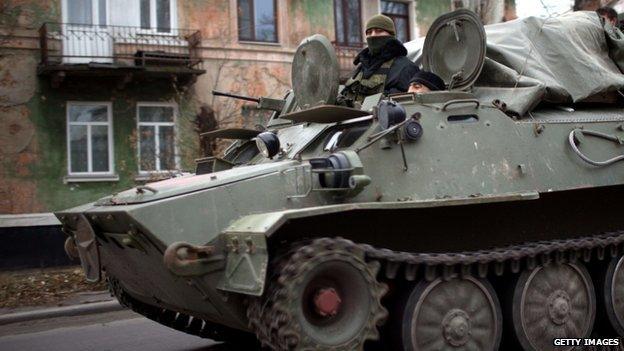
Russia has a strong military presence in eastern Ukraine
When the G20 gathered in St Petersburg, external last year, there was tension between Russia and the West over Syria.
But the idea that in a few months their host would have provoked civil war in Ukraine and taken over the Crimea would have been put down to too much vodka.
The violence of the stone thrown into these already troubled waters has sent shockwaves rippling westwards.
Nato won't confront Russia in Ukraine. Or Georgia. But it has stepped up its air patrols of the long border between East and West.
In direct response, Russia goes nose to nose with Nato in the skies and the seas.
The Swedish prime minister has confirmed there was an alien submarine in its waters. He warned, in tough language for a Scandinavian near-neutralist, that his country would defend its borders "with all available means".
This is all Dangerous Brinkmanship. That is the title of a report, external by the European Leadership Network.
It details what shirtfronting looks like: 40 serious incidents, including a near collision between a Russian jet and a civilian aircraft, and more than 100 close encounters of a military kind between Nato and Russia - a threefold rise in the last year.
Hurt and history
The think tank director Dr Ian Kearns told me they were very surprised at the scale of the incursions.
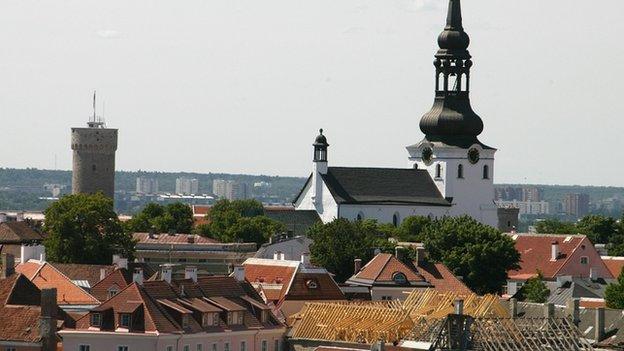
Estonia has recorded a big increase in Russian violations of its air space
"It is definitely a policy change - the (Russian) military has been told to be much more assertive, even aggressive on occasions, and operate on a much larger scale across European airspace.
"Putin is trying to demonstrate in the European theatre that Russia is back as a serious military power."
This is not a resumption of the old Cold War - if only because Nato has driven deep into what was once enemy territory. That lies at the root of the problem: there is hurt and history on both sides.
Estonia recorded six Russian violations of its airspace this year, compared with just seven in the previous seven years.
To imagine what that feels like, recall that Estonia was a Soviet state until 1991, and has only been a member of the European Union and Nato since 2004.
Or look at it from Putin's point of view: much of what was once the Russian Empire, in both Soviet and Imperial incarnations, is now part of the European Union and Nato.
All the former members of the anti-Nato alliance, the Warsaw pact, are now in Nato.
There is a strong sense in Russia today of betrayal - that when the Soviet Union fell, Nato should have evaporated too, and by now East and West should live in peace and harmony - what Gorbachev called a common European home, external.
This sense of dashed hopes and lingering injury is put brilliantly in this article, external by Fyodor Lukyanov.
Russian weakness
From the Russian point of view, the West long ago muscled into its backyard - and now it's casually strolling up the back path and preparing to make itself at home in the kitchen.
From their point of view they don't have a lot of options.
The director of King's College London's Russia Institute, Dr Sam Greene, says the aggressive response may point to Putin's weakness.
"Russia is obviously a major power, with a massive nuclear arsenal, a fairly large military, a large economy, they have a seat on the UN Security Council," he said.
"But they are not conventionally strong - they can't project force the way the US can, they don't have soft power that Europe has, and they don't have the sense that China has that time is in their favour.
"Everybody knows that China is going to be the largest economy in the world in due course. Russia is facing a very different kind of clock.
"When you don't have those kind of institutional, strategic strengths, the way you make up for that is maximising tactical advantage.
"That involves keeping everyone else off balance and taking the advantage of being the first mover.
"Russia has been moving very rapidly, in Ukraine, in domestic politics, in its relationship with the West to keep everybody guessing. Only Putin, and his very close circle know what the next move will be."
Unusual gestures
Putin has panache with a taste for the unusual gesture.
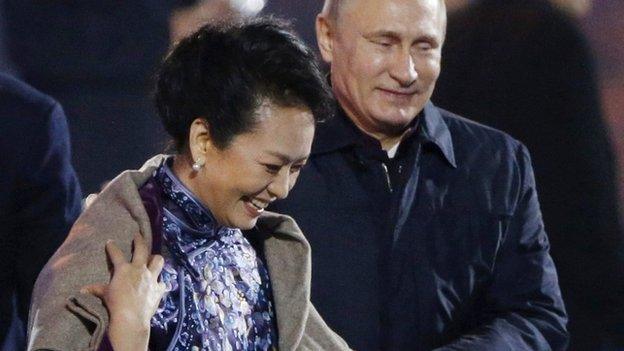
Vladimir Putin: one for the unusual gesture
A trivial example was his gallant gesture throwing a coat around the shoulders of the Chinese president's wife at the Apec summit.
It delighted Chinese people and one user of Weibo, external, the Chinese Twitter, cooed: "He is truly a man. He is the heartthrob for many women. Cool!"
The censors were not impressed and airbrushed the apparently too hot, cool moment, from the internet. But it had impact, made it clear he was a real player on the world stage.
The West seems as puzzled by Putin's Berkovian, external physical language as the Chinese censors.
In Brussels and Berlin, Westminster and Washington, they are still scratching their heads.
Policy, such as it is, amounts to hoping sanctions will work, the patient device of people with time on their side.
But Dmitry Babich, of Sputnik Radio, a station that generally supports Putin, told me this approach was doomed to fail.
"Sanctions against Russia will not be effective. It is not because Mr Putin is not afraid of these sanctions, or we find them pleasant," he said.
"The problem is when will they be lifted? Angela Merkel said when south-east Ukraine has an election that Kiev recognises. I'm afraid that will never happen.
"It will only recognise an election which its supporters win. And that is impossible.
"When sanctions do not allow you a clear vision of what you need to do to get them taken off, then they become pointless, and will continue for many years to come."
Lack of vision
The Western problem is that it lacks strategic ambition, but signals the opposite to Russia.
You don't often hear this about the EU, but it is an unwitting victim of its own success.
It is worth remembering this is all started because of a mundane diplomatic agreement that signalled the passion of some in Ukraine to move closer to Europe, to join the European Union - even though the EU is distinctly reluctant to hurry the process.
But Fiona Hill, author of the recently updated Mr Putin: Operative in the Kremlin, believes that Putin is driven by the perception that Europe and the US are trying to undermine him at home, and shrink his sphere of influence.
"His threat perception is very different, (to ours) and we have a very hard time explaining to him this is incorrect and that we haven't been trying - in our expansion of Nato and the EU - to overthrow his system," she said.
"The problem is all our policies do point in that direction - we do promote democracy and free markets - its what we are and who we are - pushing human rights and the rule of law.
"And that is antithetical right now to many of the things he is doing. He is going to see us as a threat for some time. We have to work out how to manage this relationship."
It is a sobering thought that while some in Britain are figuratively dying to leave, some in Ukraine are, quite literally, dying to join.
Game is changing
This is more than an ironic phrase - it is part of a dynamic reality that means the game could be changing, and not in a good way for the West.
At the beginning of this century, the European Union swallowed whole an enormous piece of what was once the Soviet's Eastern pie.
It is now suffering indigestion and has no appetite to further expand its waistband to the East, leaving eager applicants wondering what the future holds.
Serbia? "We are full up for the next five years at least, let's not rush things." Belarus? "Critical engagement, external" doesn't sound like enthusiasm.
If those countries are next told their workers aren't welcome in the prosperous parts of the EU, joining the club may not seem so appealing.
If the EU itself started to fracture, the beckoning future might feel like a stale past.
The tussle between East and West will last for years - but don't expect it to be a frozen conflict, static strategy between unchanging powers.
- Published17 November 2014
